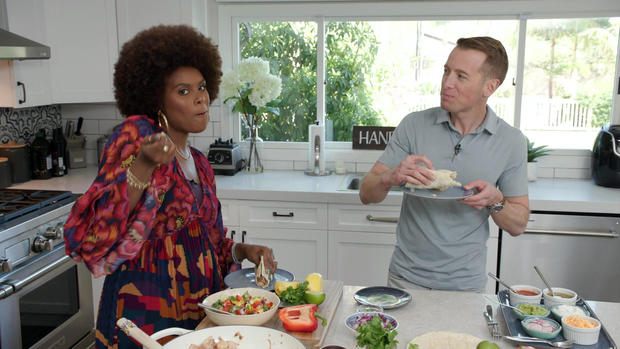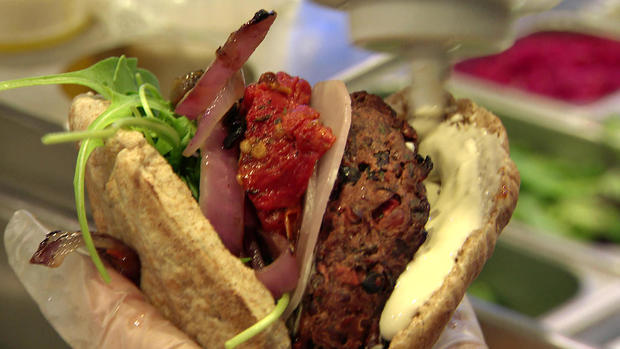Plant-based diets: Putting veggies at the center of our plates
Correspondent Ben Tracy asked actress Tabitha Brown, "Did you ever think you'd be making jackfruit tacos for your lunch?"
"Honey, absolutely not. Four years ago, I didn't think I would been vegan. Who knew? Ain't that something how life can change?"
If you were looking for someone to spread the gospel of plant-based eating, Tabitha Brown would have been an unlikely messenger, considering the food on which she grew up: "Honey, I grew up on everything. I'm from North Carolina, child; I done ate a little bit of things I should not have eaten – a lot of fried food, a lot of pork and beef, chicken, of course."
Tracy asked, "So, what did you think of vegans?"
"I honestly thought, that's for White people, particularly White women who do yoga, and maybe they're in a cult," she laughed. "Honey, that's what Tab thought!"
Brown now believes giving up all animal products and going vegan herself is what finally ended her bouts of chronic pain and fatigue. But she never could have imagined what would also happen.
"And boy, did things happen – I could have never dreamt this or thought of this."
She took her daughter's advice and started posting videos on TikTok, a healthy mix of what to eat, seasoned with a dash of how to live. The videos have racked up millions of views. She now has a bestselling book, "Feeding the Soul," and several corporate partnerships.
She said, "My goal is not to judge anyone or force my lifestyle on anyone. My goal is simply to share what it did for me. And representation matters, right? So now, when people think of vegan, they also think of a Black woman with an afro, okay?"
Recipes from Tabitha Brown:
Just 5% of U.S. households are vegan or vegetarian. But these days there are plenty you might call "plant curious." Many omnivores are now swapping out some meat for vegetables, in a diet often called "plant based," or even "flexitarian."
"Plant-based eating is a huge trend," said Marie Molde, a food trends analyst at Datassential. She said about 25% of Americans now eat a flexitarian diet, and that plant-based is one of the fastest-growing terms on restaurant menus, up nearly 3,000 in just the past four years.
At lot of that is thanks to plant-based meat alternatives. Beyond and Impossible burgers have proven it's possible to make plants taste like meat -- innovation now spreading throughout the supermarket.
Molde said, "Name any animal protein or animal product, and now there's a plant-based alternative."
Seventy-one percent of consumers have tried a plant-based meat, and more than half say they are willing to pay more for it.
"There are two major reasons why people are turning to plant-based foods," Molde said. "The first is health, and the second reason, and this is a major one, is that plant-based eating is thought to be better for our planet and better for the environment."
Global food production creates a third of all human-caused greenhouse gas emissions contributing to climate change, and raising animals for food (especially cows) accounts for nearly twice as much planet-warming emissions as plant-based foods.
"Nobody wants to be told what not to do; they want to be given a solution," said Ross Mackay, the co-founder and CEO of Daring Foods, a company creating plant-based chicken products, that's headquartered in California, far from Mackay's native Scotland. "They kicked me out when I stopped eating Scotch beef!"
Tracy said, "I gave up eating red meat, but I still eat a ton of chicken. Are you trying to convert people from real chicken to this?"
"Our mission is, of course, to rethink chicken from the food system," Mackay replied. "How do we do that? We go after the chicken lover. It's to go after you."
The average American eats about 100 pounds of chicken every year; that's 8 billion chickens, mostly raised in large factory farms. Daring's chicken product is made from soy protein, and designed to replicate the texture of the real thing.
Tracy sampled some: "This sounds ridiculous to say but, tastes like chicken!"
Daring launched its first product into the already-crowded alternative chicken market less than two years ago. It's now in more than 6,000 retail stores.
"So, what is the chicken product you feel like you need to come up with to really disrupt this market?" Tracy asked.
"The chicken cutlet is very much the holy grail of chicken," Mackay said. "From an innovation perspective, it's the toughest to go after. But we're in the first innings of this. We're barely just getting started."
But Ran Nussbacher wonders: what if we just simply enjoyed eating our vegetables? "People want real food, and real food should just be real food and not pretend to be something that it's not," he said.
Nussbacher is the founder of Shouk, a chain of Israeli street food restaurants in Washington, D.C., where the food, including their famous Shouk Burger, is proudly plant forward.
"If the objective is to reconnect people with the plant world and eating more vegetables and grains and seeds, then why go through all this effort to hide it as something different?" Nussbacher said. "Our philosophy is to do exactly the opposite – to actually demonstrate to people experientially that cauliflower can taste amazing."
Nussbacher said protecting the planet for future generations is his motivation to put plants at the center of our plates.
"I have two young kids," he said, "and unlike Elon Musk, I don't want my kids or my future grandkids growing up on Mars because we destroyed this planet. There's a misconception that the solution to climate change is buying a Tesla. The solution to climate change starts with reducing the amount of meat that we eat, and eating more vegetables."
For more info:
- iamtabithabrown.com
- "Feeding the Soul (Because It's My Business)" by Tabitha Brown (William Morrow), in Hardcover, eBook and Audio formats, available via Amazon and Indiebound
- Daring Foods
- Shouk
- Datassential
Story produced by Reid Orvedahl. Editor: Ed Givnish.
Check out the "Sunday Morning" 2021 Food Issue Recipe Index for menu suggestions from the chefs, cookbook authors, flood writers and restaurateurs featured on our program, as well as the writers and editors of New York Times Cooking.






